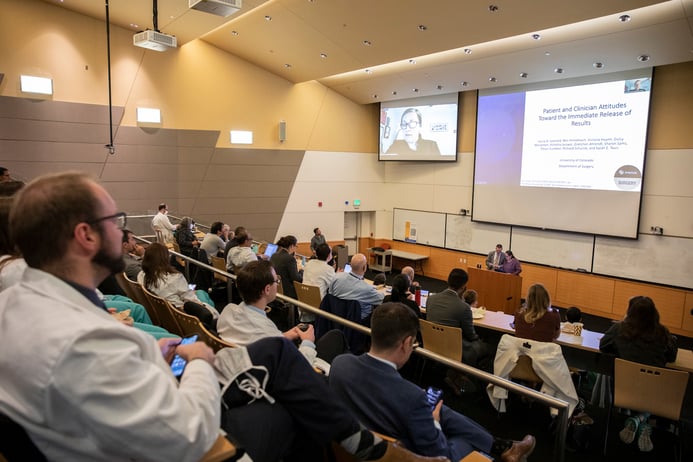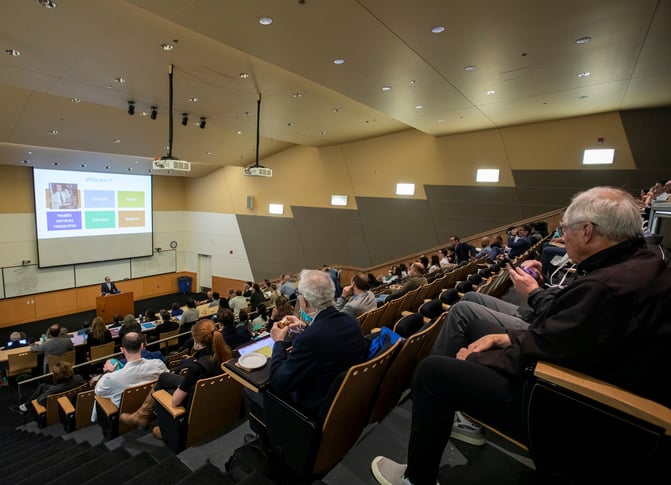Through analyzing post-operative outcome data for more than 5.5 million patients, Helen Madsen, MD, found that patients who are overweight or obese are at increased risk for post-operative infection, blood clots, and renal complications.
Anna Gergen, MD, found through animal modeling that simvastatin, a drug commonly prescribed to help lower bad cholesterol and raise good cholesterol in the blood, shows potential in preventing the development and progression of esophageal injury caused by reflux.
Their research was among the 16 projects presented Monday at the ninth-annual University of Colorado Department of Surgery Research Symposium to highlight the research conducted by general surgery residents.
“This symposium really celebrates the research activities in the Department of Surgery,” said Richard Schulick, MD, MBA, chair of surgery. “Thanks to all the residents and trainees for really pushing our department up there in terms of research activities.”
Showcasing the importance of research during residency
An important aspect of the general surgery residency program is dedicated time for research or further education. The 16 general surgery residents who presented Monday conducted research in basic and translational science or clinical and health science, working with faculty mentors through the process.

General surgery residents presented research in basic and translational science and clinical and health science.
“This is an incredibly important day where our research residents can really be showcased for their hard work with the faculty over the past few years,” said Robert Meguid, MD, MPH, an associate professor of cardiothoracic surgery.
That research includes work done by Jason Samuels, MD, who looked at the impact of bariatric surgery on the health care costs of patients who are obese. In analyzing data from about 5,400 patients who had bariatric surgery, he found that 3,100 patients went to the emergency room at least once in the two years following surgery, but fewer than 10% of those patients were admitted to the hospital.
Because emergency room visits can represent a significant expense for patients, “what tools will help patients avoid the emergency room?” he said, indicating possible considerations for further research.
Julia Coleman, MD, found through her research studying the mechanism for sex dimorphism, or different characteristics shown by sexes of the same species, in coagulation that “female and male coagulation are not the same,” she said. Her research hypothesis proposes that estradiol, a hormone often used to treat menopause symptoms, has a procoagulant effect.
Success versus fulfillment
An added highlight of the Research Symposium was a presentation by Amir Ghaferi, MD, MS, director of the Michigan Bariatric Surgery Collaborative and associate professor of surgery and business at the University of Michigan Medical School.

Amir Ghaferi, MD, MS, of the University of Michigan Medical School, spoke at the Research Symposium.
He encouraged the residents and faculty in attendance to say yes to opportunities that challenge them and encourage them to grow, while also making thoughtful decisions about pursuing success or fulfillment.
"Look around the room,” Ghaferi said. “You’re all successful. How many people have the privilege of going through medical school, being a resident, becoming a surgeon?”
He asked them to consider the meaning of fulfillment, which is more consistent with inner contentment, and success, which often is measured by external hallmarks of accomplishment and recognition. A key to understanding the difference, he said, is asking “have you left yourself a better person and the world a better place? That’s really the difference between success and fulfillment.”



.png)
